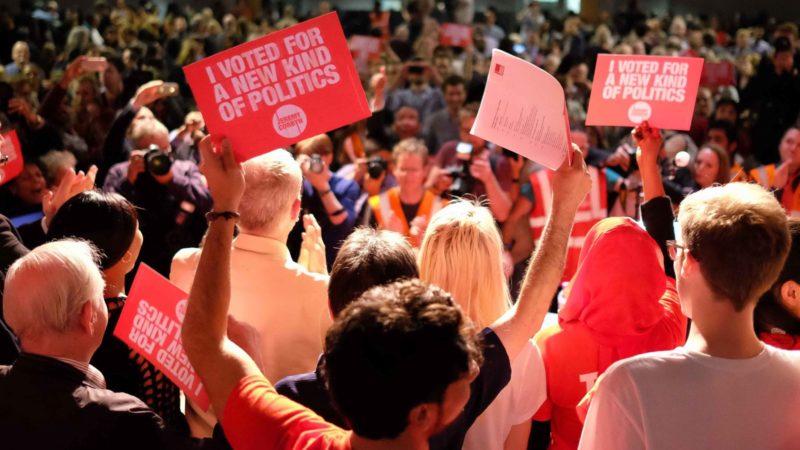
Momentum has announced that it will back a number of policy motions to be submitted to Labour conference this year. Among them were demands for a ‘green new deal’, the closure of all detention centres and the introduction of a four-day working week. Momentum members were rightly excited that the organisation is using its weight to push for political demands – but questions were also raised over how these priorities were determined.
We know that the motions were selected by members of Momentum’s national coordinating group. Some were adopted from issue-based campaign groups like Labour for a Green New Deal, while others do not specify who drafted or submitted them.
According to Momentum’s constitution, campaign priorities can be brought forward by either a member of the NCG or the membership via a Digital Democracy Platform. I think there should also be a randomly-drawn members council, renewed every six months, to give the grassroots an opportunity to feed into the process.
When Momentum first adopted its – at the time, quite controversial! – constitution in 2017, it was said that this would transform the organisation into being more open, democratic and truly member-led. But it seems crucial aspects of the constitution have not been adopted fully, and a top-down approach persists.
The NCG could have easily called on members and campaign groups to submit draft motions. MyMomentum, the online democracy tool, is up and running. It has already been used for consultation on Brexit and the Labour Party’s democracy review. There is no obvious reason why it could not have been used in the run-up to this announcement, which would have given members a say on policy priorities.
Why did the NCG not include members in the process? It’s not clear – particularly as the three “flagship motions” enjoy wide support among activists and would have had a good chance of coming out on top in a member-wide vote. But there might have also been a wider range of views on other issues. Here, the membership would benefit from an outlet for discussion and debate.
This lack of internal democracy lets members down. We also run the risk of looking hypocritical: Momentum demands a member-led Labour Party but fails to abide by the standards set out in our own constitution.
Running a democratic organisation can be messy and complicated. Perhaps the NCG wouldn’t agree with everything the membership would push forward. They could be worried about potential controversies, and by the possibility of harming Momentum’s reputation or relationship with the Labour leadership if more radical demands gained traction. Those on the NCG might therefore be more inclined to tightly control political output.
Democratic input isn’t the only area for reform. Although backing motions to go to conference is a step in the right direction, passing CLP motions is still a very party-focused task. If Momentum wants to be a social movement, it should combine this work with more outward-looking community action – as it has done with the climate crisis, by backing the green new deal motion and organising direct action against Barclay’s. But Momentum should give members a chance to determine which issues we want to work on, and what these campaigns look like.
Despite a lack of input in campaign priorities, Momentum members are now expected to pass these motions in our local Labour parties. The left has often criticised the right for treating Labour Party members as mere footsoldiers – good for delivering leaflets and knocking on doors, less key to making decisions on policy and strategy. It would be a shame if Momentum replicated this approach in its structures, when it could lead the way as a truly democratic organisation.
Other groups seem to be able to do this. The soft-left group Open Labour, for example, is hosting a national conference in the summer, at which members can debate and decide its principles and strategic objectives for the upcoming year.
As an organisation that prides itself on its radical aspirations, we cannot continue to fall short. Momentum must become a sustainable, vibrant and campaigning organisation – not a hollow vessel, which is what we risk by keeping top-down structures. Members deserve an explanation of why important parts of the constitution have yet to be enacted. Member-led democracy must be fully implemented now.




More from LabourList
‘AI regulation is key to Labour’s climate credibility’
Ben Cooper column: ‘Labour needs to rediscover its own authentic populism’
‘Westminster rethought: a new purpose built site and a museum of democracy’